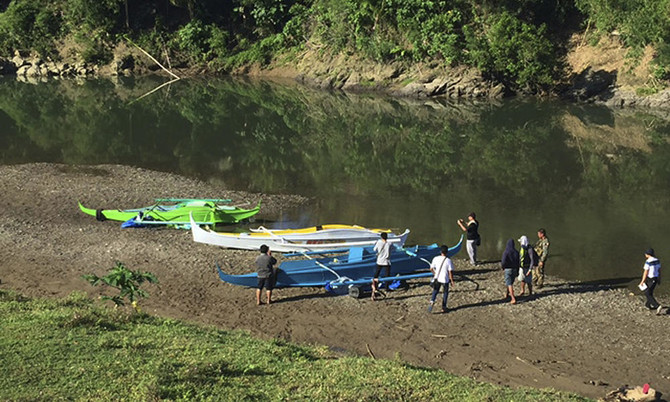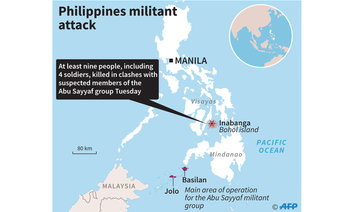MANILA, Philippines: A foiled attack on a central Philippine resort island this week was a kidnapping and bombing mission by at least three extremist groups affiliated with the Daesh group in one of their most daring terror plots, security officials said Saturday.
The Philippine military initially said that government forces, backed by airstrikes, successfully detected and thwarted a kidnapping plot by Abu Sayyaf militants in the island province of Bohol, a popular tourist destination far from the militants’ southern jungle bases.
Three soldiers, a policeman, two villagers and at least four militants, including key Abu Sayyaf commander and spokesman Moammar Askali, were killed in the daylong siege Tuesday in a hinterland village in Bohol’s Inabanga town.
Military spokesman Brig. Gen. Restituto Padilla said combined military and police forces thwarted in Bohol “major terrorist activities” by the militants, who were aiming to divert the military’s focus from intense offensives on the militants’ jungle encampments in southern Sulu province and outlying islands.
“The persons who died in the area, some of whom have been identified to be known terrorists, are still the subject of a continuing investigation to ascertain their participation,” Padilla said, adding that the result of the investigation would be made public in the near future.
Interviews with three security officials, along with documents and pictures seen by The Associated Press, indicated that three extremist groups that have pledged allegiance to Daesh deployed their leading bombers and fighters, some of whom wore Daesh-style black flag patches, for the Bohol assault.
The officials spoke on condition of anonymity because they were not authorized to disclose details of the ongoing investigation of the foiled attack.
While considered a key commander and emerging leader of Abu Sayyaf, Askali had also led a hard-line Abu Sayyaf faction called the Marakat Ansar Battalion, which is among 10 small armed groups that pledged allegiance to Daesh about three years ago and formed an Daesh-inspired alliance in the southern Philippines. Askali had been implicated in the beheadings of two Canadian hostages last year and a German tourist in February in Sulu’s jungles, the officials said.
Other Abu Sayyaf commanders have refused to align themselves with the Middle East-based extremist group, according to the officials.
Aside from Askali, another key Sulu-based militant killed in Bohol was Edimar Isnain, who had worked with Malaysian and Indonesian militants in assembling bombs and leading bomb-making training for recruits of Abu Sayyaf and another violent group called Dawla Islamiya Ranao, also known as the Maute group, based in southern Lanao del Sur province.
Troops recovered four assault rifles, rifle grenades and a sack load of bomb-making materials, including detonating cords, blasting caps and electronic bomb parts, a military report said.
The AP obtained military pictures of Isnain’s body, which was dug up by troops in Inabanga, and the other casualties, including an elderly village couple. It’s not clear whether the two Inabanga villagers were killed in the crossfire or gunned down by the cornered Abu Sayyaf militants at the height of the fighting.
The militants, who traveled from Sulu, more than 500 kilometers (300 miles) by motor boat to the south of Bohol, were guided to Inabanga’s interior hinterlands by Joselito Melloria, a convert to Islam. Military officials believed he may have been designated to lead another Daesh-linked extremist band called Ansar Khilafa Philippines had the Bohol attack been successful, the officials said. The AKP group’s leader, Mohammad Jaafar Maguid, was killed by Philippine counterterrorism forces in southern Sarangani province in January.
Melloria, who uses the nom de guerre Abu Alih and allowed the militants to stay at his Inabanga home, was wounded in the Bohol fighting and escaped with several other militants, the three officials said.
It remains unclear what the targets of the militants were, but Bohol draws foreign and local tourists for its beach resorts, waterfalls, caves and wildlife. Bohol island lies about 640 kilometers (397 miles) southeast of Manila and is about an hour by boat from Cebu province, a trade and tourism center. Bohol is to host a meeting next week of the Association of Southeast Asian Nations, the regional bloc the Philippines is leading this year.
Militants from the three Daesh-linked groups first collaborated by bombing a night market in southern Davao city, President Rodrigo Duterte’s hometown, in a 2016 attack that killed 15 people and prompted Duterte to declare a state of lawless violence. The Bohol attack was the farthest and most daring plot so far by the allied militants. Duterte has threatened to place the south under martial law if terrorism threats spiral out of control.
A few days before the Bohol violence, the US Embassy in Manila advised Americans to take precautions amid “unsubstantiated yet credible information” of possible kidnappings by terrorists in Bohol and other central areas. A number of other Western embassies, including Canada and Britain, later issued similar travel warnings to their citizens.
Philippines: Foiled attack by Daesh-linked extremists meant to divert offensive in south
Philippines: Foiled attack by Daesh-linked extremists meant to divert offensive in south

India and US to address barriers to trade and cooperation

The commitment was made at a meeting between the national security advisers of the two countries, Ajit Doval and Jake Sullivan, during Sullivan’s two-day visit to New Delhi.
The US and India are forging deeper strategic ties, with mutual concerns about an ascendant China in the Indo-Pacific region, even though India has maintained its close relationship with Russia despite its invasion of Ukraine in 2022.
Sullivan and his Indian counterpart chaired the second meeting of the India-US initiative on Critical and Emerging Technology, which they launched in January 2023.
Without naming any country, a joint fact sheet of the meeting shared by the Indian government said Sullivan and Doval “resolved to prevent the leakage of sensitive and dual-use technologies to countries of concern.”
They also launched a new strategic semiconductor partnership between US and Indian companies for precision-guided ammunition and other national security-focused electronics platforms, it said.
They also agreed to co-invest in a lithium resource project in South America and a rare earths deposit in Africa “to diversify critical mineral supply chain” and committed to soon conclude a bilateral critical minerals pact for graphite, gallium and germanium.
Last year, during Modi’s state visit to Washington, India had announced buying 31 MQ-9B drones from General Atomic, and the two countries had started discussions to jointly produce General Electric’s fighter jet engines by Hindustan Aeronautics in India, which is yet to be finalized.
Sullivan and Doval also discussed possible co-production of land warfare systems.
The visit is the first by a high-ranking US official since Prime Minister Narendra Modi returned to office with the help of allies as his party failed to win a majority.
Modi met US President Joe Biden on the sidelines of the G7 Summit in Italy last week. Sullivan met Modi and Foreign Minister Subrahmanyam Jaishankar earlier in the day.
The relationship between Washington and New Delhi has been tested after the US accused Indian government agents of plotting to murder a Sikh separatist leader on US soil last year, after Canada made similar allegations. India dismissed the Canadian accusations, but initiated an investigation into the US allegations.
The US has extradited an Indian national from the Czech Republic, whom it has indicted for the foiled assassination plot.
There have also been some concerns raised about the treatment of minorities in India.
German rescue team finds 10 bodies of suspected migrants off Italy's Lampedusa island

- The other search and rescue operation off the Calabrian coast started following a Mayday call by a French boat
ROME: Rescue workers found 10 bodies of suspected migrants below the deck of a wooden boat off Italy’s tiny Lampedusa island on Monday, the German aid group Resqship said, as the Italian coast guard searched for missing people from another vessel shipwrecked off the country's southern coast.
The crew aboard Resqship’s boat, the Nadir, “is currently caring for 51 people. The rescue came too late for 10 people,” the group said in a post on X, formerly Twitter.
“A total of 61 people were on the wooden boat, which was full of water. Our crew was able to evacuate 51 people, two of whom were unconscious – they had to be cut free with an axe,” it added. “The 10 dead are in the flooded lower deck of the boat.”
The other search and rescue operation off the Calabrian coast started following a Mayday call by a French boat, sailing about 120 miles (193.12 kilometers) from Italian shores, at the limit of the SAR areas under the jurisdiction of Greece and Italy, the Italian Coast Guard said in a statement.
After reporting the presence of the half-sunken boat, rescuers recovered 12 migrants from the vessel. The survivors were brought to the Calabrian port of Roccella Jonica, where they were disembarked and entrusted to the care of medical personnel.
One of the migrants died soon after, the coast guard said. It was not immediately clear the number of missing people from that boat.
The Italian Maritime Rescue Coordination Center (IMRCC) of the coast guard in Rome immediately diverted two merchant vessels sailing nearby to the scene of the rescue. Assets from the European Border and Coast Guard Agency Frontex also helped.
Putin extends defense ministry purge, hands job to a relative

- More than two years into the war in Ukraine, Putin has used the changes to signal that he wants to clear out wastage and corruption
MOSCOW: Russian President Vladimir Putin sacked four deputy defense ministers on Monday and appointed a relative to fill one of the resulting vacancies.
The reshuffle marked the latest stage in a radical shakeout which Putin launched in May when he unexpectedly removed his longstanding defense minister Sergei Shoigu.
More than two years into the war in Ukraine, Putin has used the changes to signal that he wants to clear out wastage and corruption in the ministry and harness Russia’s war economy more effectively to serve the needs of soldiers at the front.
In the latest changes, Putin sacked deputy defense ministers Nikolai Pankov, Ruslan Tsalikov, Tatiana Shevtsova and Pavel Popov, according to Kremlin decrees.
He appointed Anna Tsivileva, the daughter of his late cousin, as a deputy defense minister whose responsibilities will include improving social and housing support for military personnel. Her husband Sergei Tsivilev is Russia’s energy minister.
Putin had previously appointed Tsivileva as head of a state fund to support participants of Russia’s war effort in Ukraine.
Leonid Gornin, previously first deputy finance minister, will now serve as first deputy defense minister under Defense Minister Andrei Belousov, an economist with no military experience who was named last month to replace Shoigu.
Gornin’s main tasks are “to increase the transparency of financial flows and ensure efficient spending of budget funds,” the defense ministry said.
Also named as deputy defense ministers were Oleg Savelyev and Pavel Fradkov, the son of former Prime Minister Mikhail Fradkov. Fradkov will oversee the management of property, land and construction relating to the military.
Another former deputy defense minister, Timur Ivanov, was arrested on April 23 and accused of bribe-taking. Since then, four other top officials at the ministry and general staff have been arrested on the same charges in the biggest corruption scandal to hit the Russian government in years.
Low snow on the Himalayas threatens water security — study

- While snow levels fluctuate each year, scientists say climate change is driving erratic rainfall and shifting weather patterns
- Snow and ice crucial water source for around 240 million people in mountainous regions, 1.65 billion people in the river valleys below
KATMANDU: Millions of people dependent on Himalayan snowmelt for water face a “very serious” risk of shortages this year after one of the lowest rates of snowfall, scientists warned Monday.
Snowmelt is the source of about a quarter of the total water flow of 12 major river basins that originate high in the region, the report said.
“This is a wake-up call for researchers, policymakers, and downstream communities,” said report author Sher Muhammad, from the Nepal-based International Center for Integrated Mountain Development (ICIMOD).
“Lower accumulation of snow and fluctuating levels of snow pose a very serious increased risk of water shortages, particularly this year.”
Snow and ice on the Himalayas are a crucial water source for around 240 million people in the mountainous regions, as well as for another 1.65 billion people in the river valleys below, according to ICIMOD.
While snow levels fluctuate each year, scientists say climate change is driving erratic rainfall and shifting weather patterns.
The report measured “snow persistence” — the time snow remains on the ground — with levels dropping almost a fifth below normal this year across the wider Hindu Kush and Himalaya region.
“This year’s snow persistence (18.5 percent below normal) is the second-lowest in the past 22 years, narrowly trailing the record low of 19 percent set in 2018,” Muhammad told AFP.
As well as Nepal, the inter-governmental ICIMOD organization includes member countries Afghanistan, Bangladesh, Bhutan, China, India, Myanmar and Pakistan.
The report warned that ICIMOD “observations and projections indicate significant changes in the timing and intensity of stream flows,” with snow a key part.
“Snow plays a particularly important role in ensuring seasonal water availability,” it added.
The organization has been monitoring snow in the region for over two decades, noting that 2024 marked a “significant anomaly.”
The Ganges river basin, which flows through India, had the “lowest snow persistence” that ICIMOD has recorded, 17 percent below average, worse than the 15 percent in 2018.
The Helmand river basin in Afghanistan recorded its second-lowest snow persistence levels, 32 percent below normal.
The Indus river basin was down 23 percent below normal levels, while the Brahmaputra river basin, which ends in Bangladesh, had snow persistence “notably below normal” at 15 percent.
Miriam Jackson, senior cryosphere specialist at ICIMOD, urged authorities to “take proactive measures to address possible drought situations.”
Indian suspect in plot to kill Sikh separatist extradited to US

- Man accused over murder-for-hire plot extradited from Czech Republic
- Alleged plot targeted Sikh separatist resident in US, India denies involvement
WASHINGTON/PRAGUE: An Indian man suspected by the US of involvement in an unsuccessful plot to kill a Sikh separatist on American soil has been extradited to the United States from the Czech Republic, the Czech justice minister said on Monday.
Nikhil Gupta has been accused by US federal prosecutors of plotting with an Indian government official to kill Gurpatwant Singh Pannun, a US. resident who advocated for a sovereign Sikh state in northern India.
Gupta traveled to Prague from India last June and was arrested by Czech authorities. Last month, a Czech court rejected his petition to avoid being sent to the US, clearing the way for the Czech justice minister to extradite him.
“On the basis of my decision on (June 3), the Indian citizen Nikhil Gupta, who is suspected of conspiracy to commit murder-for-hire with intent to cause death, was extradited to the US on Friday (June 14) for criminal prosecution,” Czech Justice Minister Pavel Blazek said on social media platform X.
The comments confirmed an earlier Reuters story reporting on the extradition that cited the federal Bureau of Prisons website and a source familiar with the matter.
An inmate search by name on the Bureau of Prisons website showed on Sunday that Gupta, 52, was being held at the Metropolitan Detention Center, Brooklyn, a federal administrative detention facility.
A US Justice Department spokesperson declined to comment. Gupta’s US-based lawyer, attorney Jeffrey Chabrowe, had no immediate comment.
Over a dozen people were killed and tens injured after a freight train smashed into the back of a stationary passenger train in India’s West Bengal state on Monday,
DIPLOMATIC RELATIONS TESTED
The discovery of alleged assassination plots against Sikh separatists in the US and Canada has tested relations with India, seen by Western nations as a counter to China’s rising global influence. India’s government denies involvement in such plots.
Canada said in September its intelligence agencies were pursuing allegations linking India’s government to the murder of Sikh separatist leader Hardeep Singh Nijjar in June 2023 in Canada.
In November, US authorities said an Indian government official had directed the plot in the attempted murder of Pannun, who is a US and Canadian citizen. Gupta is accused of involvement in that plot.
Pannun told Reuters on Sunday that while the extradition was a welcome step, “Nikhil Gupta is just a foot soldier.” He alleged that those who hired Gupta were senior members of the Indian government who act on the direction of Prime Minister Narendra Modi.
India’s government has dissociated itself from the plot against Pannun, saying it was against government policy. It has said it would formally investigate security concerns raised by Washington.
New Delhi has long complained about Sikh separatist groups outside India, viewing them as security threats. The groups have kept alive the movement for Khalistan, or the demand for an independent Sikh state to be carved out of India.
Last month, Washington said it was satisfied so far with India’s moves to ensure accountability in the alleged plots, but added that many steps still needed to be taken.
















